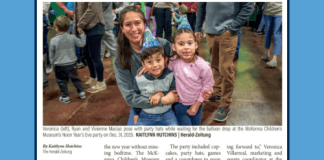By Megan Sayles
AFRO Staff Writer
msayles@afro.com
As a sophomore at South Carolina State University, Shawn Callaway’s life changed in an instant when a stray bullet—accidentally fired by a fellow student playing with a gun—struck him in the temple and left him blind.
The accident led him to rethink his future, leading him to believe that becoming a parent was no longer possible. But, after attending a meeting with the National Federation of the Blind (NFB), he saw blind parents thriving and realized his aspiration was still possible.
Today, Callaway serves as president of the National Organization of Blind Black Leaders, a division within the NFB. Established to address the unique challenges and compounded exclusion experienced by Black blind Americans, the organization has become a vehicle for awareness and advocacy.
The AFRO spoke with Callaway about the organization’s origins, the misconceptions Black blind people face within their own communities and his efforts to advance inclusion.
AFRO: What prompted the launch of the National Organization of Blind Black Leaders division within the National Federation of the Blind, and what gaps were you trying to fill?
Shawn Callaway: We started off in 2018 as a committee called Black Leaders Serving for Advancement. The ultimate goal was to bring awareness to Black people within the blindness community and make inclusive spaces for us within the blindness community. But, then a couple of things happened.
George Floyd was murdered, and there were all of these discussions and town halls about how Black people needed to be treated better in the community. However, when these discussions were had, there were no blind people or people with disabilities at the table. We felt marginalized by our own people. We wanted to transform that by raising awareness. In 2022, we started the National Organization of Blind Black Leaders.
Within our organization, we also reach out to and recruit the Black members of the National Federation of the Blind. Then, what we do is discuss issues that affect us as Black people within the blindness community.
AFRO: What are some of the common biases that Black people in the blindness community face?
SC: It’s always assumptions about our capability. For example, in the Black church there’s been countless discussions on how we can be inclusive in the church. They tell us we have the ability to serve God by participating in different ministries, but I can’t tell you how many times I’ve received calls from a blind person who says a ministry is apprehensive about them joining. They don’t think the person can be a part of the kitchen ministry and cut vegetables or be an usher because they’re blind.
This also extends to the dating realm. I’ve been married for 20 years now, but prior to that it was hard. I would meet a young lady, and next thing I know she would tell her parents about me and they would question why she was dating a blind man. These are Black people telling their daughters don’t date that blind man because you might have to take care of him or do things for him.
Another example is “The Breakfast Club,” which is a wildly popular show, questioning the ability of a blind person to take care of a child or be a caregiver. They made fun of us, and I’ll never forget it. What hurt the most is that Charlamagne said he didn’t believe that blind people should be watching children, but he would be willing to learn how they can. But, when we reached out, “The Breakfast Club” never responded.
Simply put, it’s like you’re being marginalized by marginalized people. We don’t have a voice.

AFRO: What are the core values and goals that drive the work of the National Organization of Blind Black Leaders today?
SC: The main thing we preach is information and awareness. We have several groups and committees, including a women’s group; men’s group; seniors’ group; mentor and outreach group; Black elected leaders group; historically Black college and university (HBCU) committee and health and wellness committee. We use them to discuss and bring awareness to the things that may plague us in our community. We also bring in outstanding speakers that cover different topics within those groups. It’s not all doom and gloom.
We’ve had Haben Girma, the first deafblind lawyer to graduate from Harvard University, present in the women’s group to show them what success can look like as a blind, Black woman. The National Federation of the Blind also just had its convention in New Orleans, and we invited a representative from the National Council of Negro Women to come to our meeting.
We’re trying to make inroads with major organizations, like the NAACP, National Urban League and others, to say we’re here and we would like a seat at the table as well.
AFRO: What programs, events or initiatives have you held to further the mission of the organization?
SC: We conduct several different Zoom programs every month where we have special guest speakers. We talk about health issues, dating, employment, independent skills training, mental health and more. We also mentor people who are newly blind. We try to provide guidance because they are around people in their families who don’t know anything about blindness, and that can put them in a position of dependency.
One of the things we are preparing to do is raise funds for scholarships for blind, Black students. The National Federation of the Blind, as a whole, is also working hard to establish a museum for the blind people’s movement. It would be located in Baltimore, and it would tell the stories of blind people throughout history.
For more information about the National Federation of the Blind and National Organization of Blind Black Leaders, visit: www.nfb.org.
Great Job Megan Sayles AFRO Staff Writer & the Team @ AFRO American Newspapers Source link for sharing this story.





